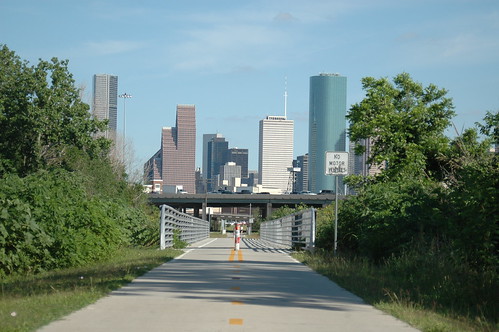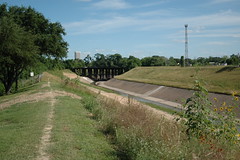“Houston is the sleeper — the next big bicycle city that nobody knows about yet,” Tom McCasland told us on Thursday.
I was, of course, skeptical. My impression of Houston so far was all potholes, unpredictable driving, the chaotic geography of a city without zoning, and only a few sightings of hardy bicyclists. A conversation the night before with our host, a bike advocate, hadn’t altered that impression much. Besides, aren’t Southern cities, big and grey and built for cars, supposed to be harder to “green”?
But McCasland offered to take us on a bike ride to prove his point, and Joe and I weren’t about to turn him down. While Joshua cooked up some magic in the basement of Georgia’s Market (downtown’s only, if fancy, grocery store), we set off.
The thing that sets Houston up for success, McCasland told us as we drove out of downtown, is that the business community, including the oil companies and airlines that are the city’s biggest employers, is all for it. Quality of life is the reason, a lure for energetic, young new hires. As things currently stand, “it’s a tough sell to bring people here.” But there’s hope, in the form of cheap right of way around the city’s many bayous and a plan to transform an existing piecemeal trail system into a world class bicycling network.
McCasland is currently serving as interim director of the county’s beleaguered housing authority; until being tapped to clean up that agency last month, he was at the nonprofit Parks Board, where he led the gargantuan effort to put together a $500 million plan to build a 300 mile network of off-street bike trails that will link up the entire city.
The funding mechanism for this plan is a complex patchwork, including a large federal TIGER grant application that was just submitted. A bond measure will be voted on later this year to raise matching funds for a major chunk of it. Thanks to the business community’s support, McCasland told us, “It’s not a question of if we win this, but by what percentage.”
We saw a small scale success story first hand at our first stop, the Blue Line Bike Lab bike shop. The owner, Fred, had agreed to lend Joe and I bikes for the afternoon so we could check out the bayou trail network and its current gaps. When the shop opened seven years ago, Fred recounted, “People were like, ‘You’re geniuses!’ And we were like, ‘Well yeah, we know, but what are you talking about?'” They figured it out two years later, when a new section of the bayou trail network was built a block from their door. Business boomed.
We set off on a ride down that paved trail. After passing uneventfully through a residential neighborhood for several blocks, it ended in a sharp curb and a field of broken glass and gravel. The lot turned into a truck path, which ended at a decrepit railroad bridge. We took a sharp right down a singletrack path along the edge of the bayou far below us. It’s the site of the future trail “that will connect the two largest working class neighborhoods in the city with downtown,” as Fred had put it earlier. “When that happens, biking in this city is going to blow up.”
The next part of our route was through private property; we had the choice of taking surface streets or riding down along the bayou’s edge. We chose the latter and ran with our bikes down the steep concrete incline to coast along by the water and look up at the gaps in the system. After a while we scrambled up another steep embankment, lifted our bikes over a tall railing, and were back on city streets, taking the lane on a five lane arterial.
McCasland’s vision is basically the Minneapolis model of bikeway development. As such, it might not be so far fetched. After all, Minneapolis’s extensive off-road greenway system (which I visited on tour last year) connects the major areas of the city; people can then get to most of their exact destinations on neighborhood streets and a slowly increasing network of bike lanes and crossings. Once that had happened, and a few key on-street connections were made, Minneapolis went from barely on the radar of bike mavens to winning the #1 ranking in the country, with nearly the ridership stats to back that up.
If Minneapolis, then why not Houston? I’ll be rooting for them.
Here’s a slideshow of photos taken on our ride:
Update: Houston has just won its first $25 million towards building out the bayou bikeway system.
This is a dispatch from the month-long Dinner & Bikes tour of the south and midwest; we’re putting on a vegan dinner a talk about bicycling, and bike movies in a different city each night. I’m blogging as I go — find the updates here.

